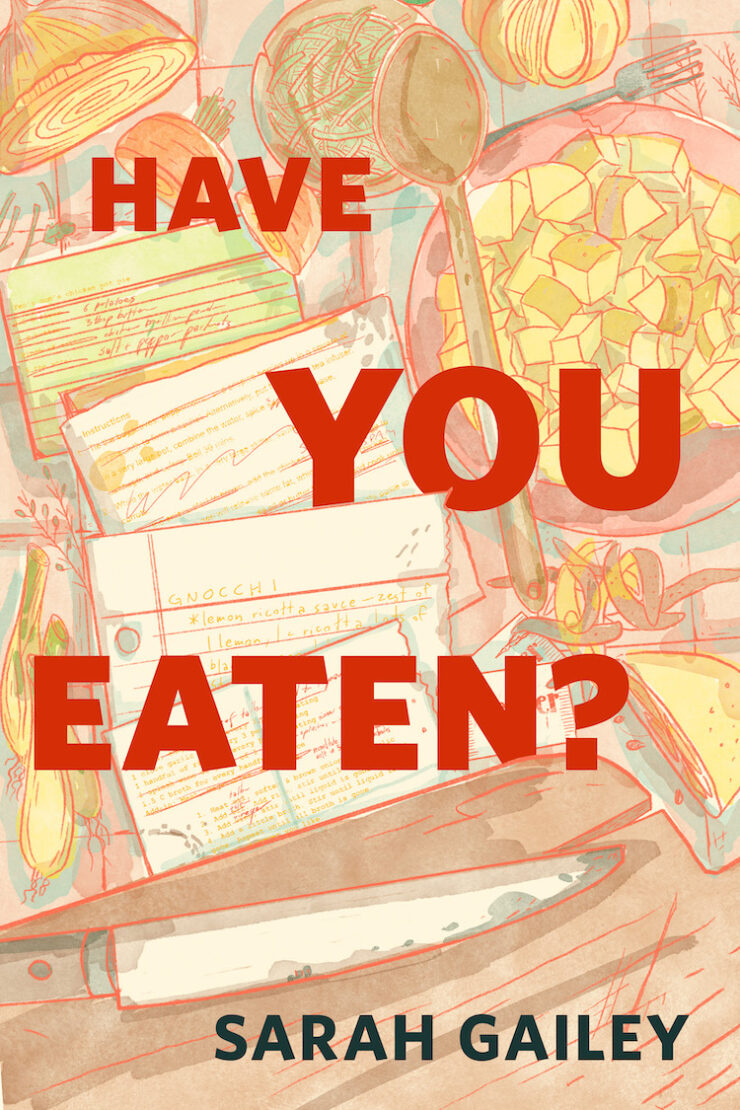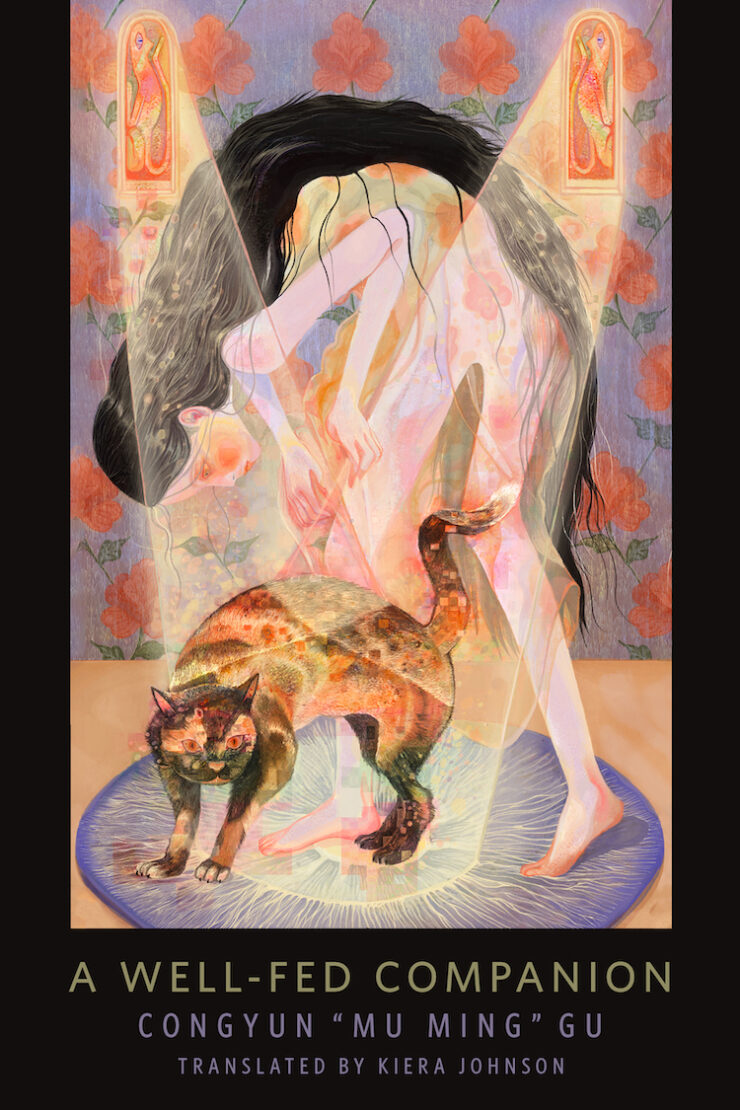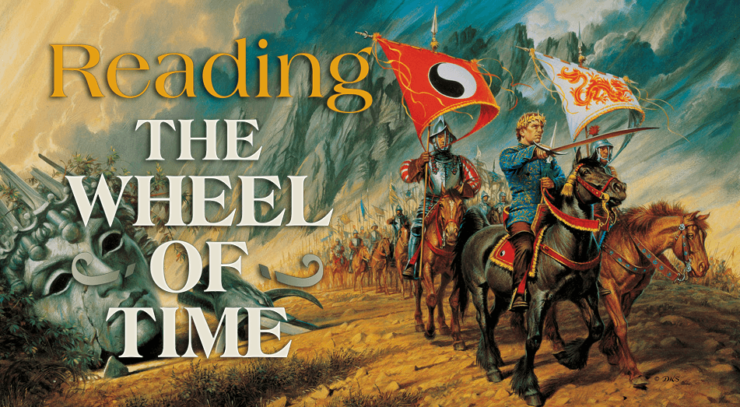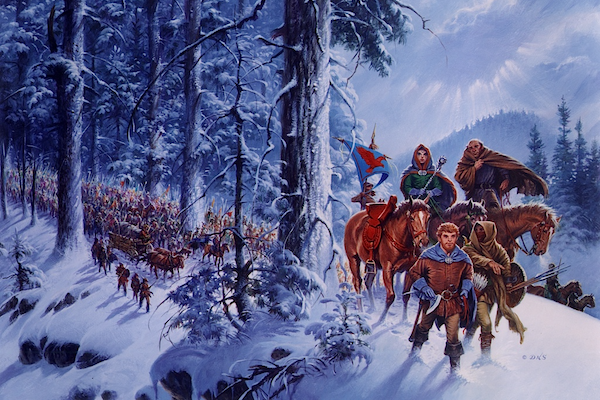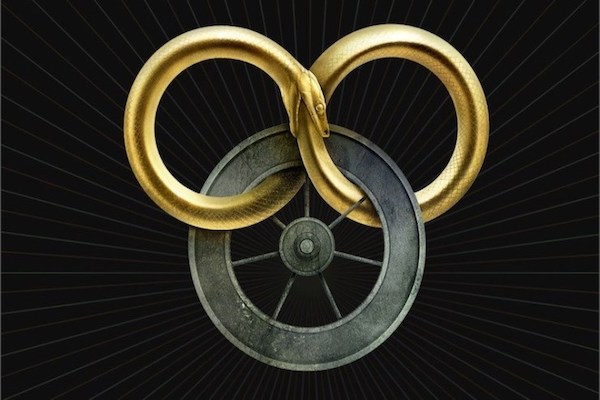It’s hard to believe that we’re already getting close to the end of The Path of Daggers. After this week, in which we’re covering Chapters 27 and 28, there will be only three more left—two, really, since 31 is basically just an afterword—before we segue into Winter’s Heart. It feels fitting really, since fall is starting where I live, and the end of The Path of Daggers is definitely leaving us with a sense of chill, both literally and metaphorically.
Min struggles to focus on Reason and Unreason in the oppressive atmosphere of Rand’s throne room in the Sun Palace. Rand comes in, apparently in high spirits, remarking that the Maidens didn’t look happy to see him. Min suggests that they, like she, might have been worried. Rand sweeps her up in his arms and kisses her.
They are interrupted by Dobraine, who reports to Rand that Toram has disappeared, and rumors say that Hanlon and Mordeth have deserted him. Dobraine has trustworthy servants looking after Ailil, Anaiyella, and Weiramon. He also reports that Lady Caraline and the High Lord Darlin are staying in the city under the “protection” of Cadsuane.
Rafela and Merana come in, to tell Rand the results of their Bargain with the Atha’an Miere. He has been granted access to the Sea Folk ships whenever and wherever he needs them. In exchange, Rafela and Merana have agreed in Rand’s name that Rand will not alter any of the Sea Folk’s laws and that the Sea Folk will be granted one square mile of land in every city located on navigable water that is or comes under Rand’s control, which will be under Sea Folk law.
Dobraine is concerned that this will allow the Sea Folk to avoid customs duties and docking fees, and that such an agreement will ruin any port in which this Bargain is enforced. Rand points out that the agreement doesn’t say who chooses the land or that it has to be on the water.
Buy the Book
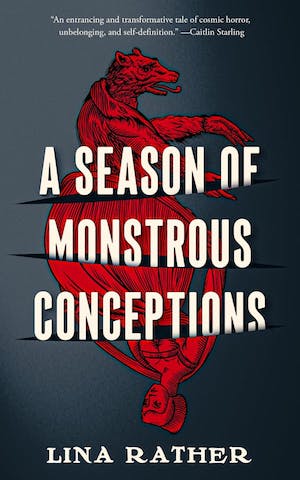

A Season of Monstrous Conceptions
But there is more to the agreement. Rand must keep a Sea Folk ambassador with him at all times—for now it will be Harine din Togara Two Winds, accompanied by a retinue—and that he must promptly answer a summons from the Mistress of the Ships, though not more than twice in any three consecutive years. Rand loses his temper at this, but Merana draws herself up, angry in turn.
“You castigate us?” she snapped in tones as frosty as her eyes were hot. She was Aes Sedai as the child Min had seen them, regal above queens, powerful above powers. “You were present in the beginning, ta’veren, and you twisted them as you wanted them. You could have had them all kneeling to you! But you left! They were not pleased to know they had been dancing for a ta’veren.”
She tells Rand that she and Rafela were shielded as soon as he left, and that Harine threatened to hang them by their toes from the rigging. She tells Rand he should feel lucky that he got the ships he wanted at all.
“Oh, by the by, she formally acknowledged you as the Coramoor, may you get a bellyache from it!”
Rand’s anger ebbs, and he remarks that being ta’veren doesn’t always draw out the words one wants to hear. He praises the two Aes Sedai for their success, despite the difficult position he put them in.
Rand asks Min to have the Maidens carry a summons to Cadsuane, ignoring Min when she suggests that it is not a good idea. While they wait, Rand compares letting someone know that you need them to putting a halter on your own neck, but also admits to needing Min.
The mood shifts with that romantic expression, and Rand starts undressing. Suddenly Somara, Nesair, and Nandera come in and begin beating Rand. Min is knocked down when she tries to defend him. It looks to her like they are going to beat him to death, but they are careful to avoid the unhealed wound on his side. They don’t stop until Rand crumples to the floor.
“Nesair bent to catch a fistful of his hair and jerk his head up. “We won the right for this,” she growled, “but every Maiden wanted to lay her hands on you. I left my clan for you, Rand al’Thor. I will not have you spit on me!”
Somara adds that this is how they treat a first brother who dishonors them, and that if it were to happen again the beating would be worse. Nandera says that he broke his promise to bring them with him into battle, and reminds him that he carries the honor of the Far Dareis Mai.
Min thinks the Maidens have lost their minds, but Rand tells her that the Maidens have the right to do what they did. She helps him to the bed and they both lie down, and then Daigian arrives to tell him that Cadsuane can’t see him right now, as she’s busy with her needlepoint, but perhaps she might be able to find the time another day. Rand snaps at Daigian, but once she’s gone Min reminds Rand that he needs Cadsuane, and she doesn’t need him.
Rand decides to go to Cadsuane. He leaves Min behind, guarded by Narishma. With Dashiva, Flinn, Morr and Hopwil he traverses the halls to where Cadsuane is. Servants and nobles alike hurry out of his path or watch him with dark looks.
When they reach the room, Dashiva announces Rand, using the One Power to amplify his voice and a weave that Rand doesn’t recognize to give the room a sense of foreboding and menace. But Cadsuane isn’t awed, or even impressed, and Rand sends the Asha’man to wait outside.
Rand sits, showing off with the One Power, and Cadsuane remains apparently unaffected. He reminds himself that he owes Cadsuane for saving his life, and tells her that he wants her to be his advisor. She is dismissive of the idea, and Rand, reminding himself of Min’s viewing, repeats the offer with the promise that Cadsuane wouldn’t have to take any oaths.
She offers him a few promises in return, that she would expect him to listen but that she wouldn’t make him do what she wants; that she doesn’t expect to be told all the intimate details of his heart; and that whatever she does will be for Rand’s good, not the good of the White Tower. But she also gives him some rules for his own behavior, that he and his Asha’man will be civil to her and to her guests, which includes not channeling at them and Rand keeping his temper in check.
As Rand, furious, starts to leave, Cadsuane calmly remarks that she hopes he hasn’t tried to use Callandor, because he might not escape a second time. Rand demands to know what she means, and Cadsuane responds that he must ask for her help politely, and apologize for his behavior today. But she also admits that she has learned that Callandor is flawed. It lacks the buffer that make sa’angreal safe to use, and magnifies the taint as well, “increasing the wildness of the mind.”
“The only safe way for you to use The Sword That Is Not a Sword, the only way to use it without the risk of killing yourself, or trying to do the Light alone knows what insanity, is linked with two women, and one of them guiding the flows.”
Rand leaves, with Cadsuane calling after him that she might even agree to be his advisor if his apology sounds sincere enough, but he isn’t listening anymore. He’s thinking about his plans, and how, without Callandor, there is only one option left to him. He’s terrified of that option, and hears Lanfear’s voice in his head telling him how he could challenge the Creator.
In a village in Andor, Elayne wakes feeling optimistic, but she is soon confronted with a crisis between the Kin and the Aes Sedai. Adeleas has discovered that Garenia is actually Zarya Alkaese, a novice who ran away from the White Tower seventy years ago. She tells Elayne that Tower law demands that Zarya be put in white immediately and kept under strict dicipline until she can be returned to the Tower for punishment.
Elayne knows that the Tower will never let go of a woman as strong in the One Power as Zarya, but also wonders how Zarya will handle becoming a novice after living as a free woman for so long. Suddenly, Kirstian drops to her knees, submitting herself to Adeleas’s mercy as having run away almost three hundred years ago. Adeleas boggles at the number but recovers herself, and tells Kirstian that turning herself in willingly will gain her some mitigation in her punishment. Kirstian admits that this is why she did it.
One of the other Kin members demands to know why they should allow the Aes Sedai to take members of their number by force, and insists that it isn’t in the Kin’s rules to return runaways. Alise agrees with this, startling Reanne. Reanne reminds everyone that the Kin’s rule has always been to keep runaways apart from the rest of their number until they were sure they were no longer being hunted, and to return them if they were found by the sisters. She asks if Alise is proposing that they set themselves against the Aes Sedai.
Other members of the crowd shout affirmatives to this question, and point out that the Kin far outnumber the Aes Sedai. Elayne, with Aviendha beside her, embraces the source, but Alise cuts in, ordering those who are the most vocal to report themselves to her later, with switches they cut with their own hands, then tells Reane that she will report herself for judgment at the end of the day. Everyone disperses, but Elayne still sees dark looks in the eyes of the Kin whenever they look at Aes Sedai.
Nine days of traveling (and waiting out storms) later, Elayne is feeling more than tense and wondering if they can make it the last ten miles to Caemlyn without a murder. Kirstian comes into her room, dressed in white, to tell Elayne and Nynaeve that Lan sent her to bring them to him. They find Lan in the hut where Adeleas was staying with Ispan. Both women have been murdered. Vandene finds them while Nynaeve is examining the teapot on the table. She puts on her best Aes Sedai serenity and asks what happened, and Nynaeve reports that the tea has been drugged with crimsonthorn root.
“A little kills pain,” Nynaeve said. “This much… This much kills, but slowly. Even a few sips would be enough.” Taking a deep breath, she added, “They might have remained conscious for hours. Not able to move, but aware. Either whoever did this didn’t want to risk someone coming too soon with an antidote—not that I know one, for a brew this strong—or else they wanted one or the other to know who was killing them.”
Vandene supposes that is Ispan, judging from the way the Black sister was killed. She also points out that Adeleas would never have accepted anything to drink from someone she didn’t know, which means that one of their party is a Darkfriend.
Elayne is very relieved when they finally reach Caemlyn. They ride through the city, and Elayne takes notice of all the Aiel; she loves Aviendha, but doesn’t like the idea of an army occupying Caemlyn.
At the tall gilded gates of the Palace, Elayne rode forward alone in her travel-stained gray riding dress. Tradition and legend said women who first approached the Palace in splendor always failed. She had made clear that she had to do it alone, yet she almost wished Aviendha and Birgitte had succeeded in overruling her.
Elayne announces herself formally and the gates are opened for her. Her companions follow, and Elayne leaves everyone in Mistress Harfor’s capable hands and goes straight to the Grand Hall. She’s relieved to see that the Dragon Throne isn’t there anymore, and that the Lion Throne has been returned to its proper place. She takes a moment to swear an oath with her hand on the throne.
She’s interrupted by Dyelin, who asks if Elayne has come to accept the throne from the Dragon Reborn. Elayne counters that she claims the throne by her own right. Dyelin says that, in that case, she stands for Elayne, then runs through a list of potential rivals. She admits that the powerful houses might unite behind one candidate—Dyelin herself.
When Dyelin asks what Elayne is going to do about the Dragon Reborn, Elayne answers that she intends to bond Rand as her Warder, and that she also intends to marry him. However, this has nothing to do with her plans for Andor.
Daved Hanlon arrives in Caemlyn. He has been ordered by Moghedien to go to a specific house and to obey the orders of Lady Shiaine. He is shown down into a basement, where Shiaine has a man and an Aes Sedai bound with their heads stuck up through a table. Shiaine tells Hanlon that Jaichim failed very badly, and that the Great Master Moridin wants him punished. Hanlon has no idea who Moridin is.
Shiaine has a funnel thrust into Jaichim’s mouth, and brandy poured into it until he dies. She turns her attention to the Aes Sedai, who begs and pleads to be allowed to serve, promising she won’t fail again. Hanlon is impressed that Shiaine managed to break an Aes Sedai. Shiaine asks him if he would like to put his hands on a queen.
I have read the section with Cadsuane four times now, and every time I read through it I waffled on my feelings about her. Her terms to Rand are quite reasonable, especially with her promise that everything she does will be for him, not for herself or for the Tower. Of course, Rand isn’t going to have an easy time trusting any Aes Sedai’s word even when it’s as ironclad as the oath he made them swear at Dumai’s Wells. And of course, even a legend like Cadsuane is capable of making mistakes and being wrong about things, so her promise that she will act for Rand’s own good doesn’t mean she would never steer him wrong, or steer him in a direction he disagrees with. But she does seem to be speaking quite plainly, for an Aes Sedai, and “Whatever I do, it will be for your own good; not mine, not the good of the White Tower, yours,” doesn’t seem to have too much room for a second layer of ambiguity, other than the fact that what is good for him might be somewhat subjective.
Rand’s behaving badly here, and I think Cadsuane is absolutely right to demand an apology and that he treat her differently in the future. But I can’t really blame Rand for reacting angrily when she speaks to him the way she does. I mean, I certainly wouldn’t respond well to someone, even a woman of great age and experience, calling me a little boy and threatening to spank me if I didn’t behave as she thought properly, especially if I’d once been tortured by women she calls sisters.
So much of Rand’s bad attitude comes from the fact that no one treats him like a person. For many, he is a terrifying and dangerous figure of legend and prophecy, to be either murdered, avoided, or brown-nosed to. For the rest (mostly Aes Sedai and a few other powerful people) he’s treated as an ignoramus who couldn’t possibly understand the great responsibility that fate has heaped on his wide country bumpkin shoulders. As badly as Rand is handling himself right now, it’s kind of hard to blame him when these two reactions are all he’s been engaging with since his identity was revealed. One of the reasons he has become so arrogant is because people kept accusing him of putting on airs. One of the reasons he’s so aggressive is because no one wanted to listen to him when he was reasonable. He responded to his kidnapping and torture the only way he knew how, by binding the Aes Sedai so that they could never treat him that way again even if the wanted to.
Yes, the power and prestige has also gone to his head. And yes, he has become more violent and angry, because of the taint, and because he’s repressing all his other emotions, for fear of being seen as weak and vulnerable to his enemies. Cadsuane can’t really do anything about the taint, and she is hoping to do something about the repression, but I think that she could make a lot more headway with Rand if she didn’t treat him like a stupid child all the time.
Maybe it’s just me, but there’s a big difference between telling someone they are a child, or that they’re foolish, or that they’re bad and telling them that they are behaving childishly/foolishly/badly. If that’s what Cadsuane is trying to communicate, then she should say so. People, generally, tend to meet the expectations you set for them—if she acts like Rand is a foolish little boy, she shouldn’t really be surprised when that’s what she gets. On the other hand, if she gave him an indication that she might be willing to see him as an equal, if he met her on that level, Rand might surprise her.
After all, look at the way he reacted to Merana’s dressing down. He was behaving badly towards her, and she didn’t need to soften her reaction. She called him out for his behavior, and Rand saw that she was right to, backed down, and admitted he was wrong. He didn’t exactly apologize for shouting, but it was close. I kind of don’t like the implication that it was Rand’s ta’veren nature that pulled that response out of Merana—I think it’s more narratively interesting if she has more agency in the decision—but then ta’veren-ness is pretty wooly so I suppose it doesn’t really matter what, exactly, made her snap in that moment.
Now, it’s possible that Cadsuane is being perfectly frank, and that she does really see Rand as a child who is mostly beneath her as a person. But every time I read over the section, I kept thinking about that moment when, standing over his unconscious body, she expressed sympathy for him and promised not to hurt him any more than she had to. And the thing is, I think she sees right through Rand’s display with the One Power. She knows he is afraid of her, and all Aes Sedai, and she knows why. This gives her an upper hand in their encounters, but I’m not sure that mocking him, that throwing that fear in his face, is the way to go.
Of course Rand reacted badly. And maybe he would have rejected her reasonable conditions regardless of how they were put to him, but I think it’s very significant that Cadsuane doesn’t try that approach first. She probably intends to wear him down. She clearly knows that she has the upper hand over him, despite his power and identity, and intends to use that leverage to force him to come back to her again and again until he is able to ask for it in a way that she approves of.
I’m not saying Rand doesn’t need a heavy dose of humility. But I’m just so aware of how much he despises himself, and how similar Cadsuane’s tactics are to the ones that have been used by other Aes Sedai before her, including Galina and her crew. Thematically speaking, that is—there is obviously a huge difference in the execution. But ultimately, Cadsuane seems to be trying to break Rand, just as the Aes Sedai do to their initiates, in order to build him back up into a better version of himself. And that bothers me.
Despite the fact that Jordan gives the different cultures in his story varying philosophies in many respects, I’ve noticed that there’s one mindset that they all seem to share, or at least all the ones that are presented by the narrative as disciplined and successful societies, at any rate. And that is the concept that the only way to become strong enough to survive in the world is to be subjected to intense discipline and corporal punishment by those in charge of your teaching, and either to be broken and rebuilt or to prove your worth by surviving it. In either case, there are people who can’t cut it, who wash out of the White Tower or who aren’t considered worthy by the society to which they belong. And while Jordan has some very interesting critiques of these systems, especially the Aes Sedai’s, my impression has always been that the narrative is commenting on the methods employed, not the underlying belief system.
We haven’t yet encountered a single culture that doesn’t look to mortification, as the Aes Sedai put it, as the antidote to everything. Mistakes, insubordination, amoral behavior, pranks, interpersonal conflict… it all seems to lead to the idea that punishment is the cure for personal failings. This is especially true of the Aiel and the Aes Sedai (and thus also the Kin). The idea is that punishment and suffering cleanses away transgression, especially when it is public suffering. We see this in Silviana’s disgust over Elaida’s “private penance.” Silviana makes a distinction between what she thinks of as penance, which is public, and punishment, which occurs in private—there is a sort of performance there, a lowering of oneself before others, in public punishment. When Sulin shames a gai’shain by speaking to her as she would a Maiden, Sulin then puts herself in a position to experience an equal shame by becoming a maid in the palace. When Egwene harms her friends by lying to them, she has them harm her physically by beating her. Similarly, when Moiraine realizes that Tamara’s death is an opportunity for her, she feels guilty that she thought of a woman’s death in light of what it could do for her. She wears revealing clothes to the funeral to experience embarrassment as a private penance for the thought.
The Maidens beating Rand is an interesting example of this mindset because it isn’t a penance, isn’t Rand trying to meet toh he has incurred towards them. It is a punishment, or perhaps one might call it an insult, just as Rand leaving them behind was considered an insult. Rand recognizes this, which is why he tells Min that the Maidens had a right to do it, but it’s interesting that Rand never thought to come to the Maidens to meet the toh he had incurred towards them. Probably he thought it would interfere too much with his busy lifestyle of trying to unite the world, or maybe it didn’t even occur to him since he doesn’t really follow Aiel customs, despite being the car’a’carn and descended from a Maiden. Since the beating was carried out in private (except for Min’s presence) Rand didn’t have to opportunity to meet his toh—this was a punishment only. That’s why the Maidens have remained cold to him, a fact that Rand doesn’t really seem to grasp. It may be that he doesn’t really understand ji’e’toh well enough to understand the nuances here.
Cadsuane isn’t asking Rand to perform penance, exactly, but she is asking for a certain amount of humbling himself. Which, as I’ve stated above, is fair and warranted. However, she is also shaming him by the way she speaks to him. I would like more of an insight into her thinking, to know why she feels this is necessary. It may be that she is more affected by his attitude than she lets on, or perhaps by the fact that he keeps some Aes Sedai prisoner and others basically as servants who have sworn fealty to him. Cadsuane is an Aes Sedai, an old and powerful one who is used to making Kings and Queen tremble, as she puts it. She feels (not without some reason) that she is owed a very high level of deference.
But I just can’t get past the idea that Rand responds well to reasonableness, and that a little bit of gentleness might actually go a long way with him. Cadsuane does want to teach Rand to value the softer emotions, but if she’s unwilling to model some of that herself it’s going to be much, much harder to do. It is a lesson Rand desperately needs to learn, but I don’t believe he needs to be brow-beaten into it.
I must say, I love Min but her character is starting to become awfully flat, spending all her time sitting around in Rand’s quarters waiting for something to happen. She has always been a character that things just happen to, mostly because of her visions, but these days she is mostly just a plot device for Rand, there to offer him love and unconditional support when no one else does and to bring in that air of a frustrated wife, but I thought she’d be doing more on her own, especially since she has her own rapport with the Wise Ones.
Adeleas’s death came as a total shock to me, but in hindsight it really shouldn’t have been. Ispan may have been able to hold back information about her fellow Black Ajah members, or maybe she didn’t have that much information to give, but she probably was a liability to at least a few Black Ajah or Darkfriends. It’s interesting to think that there might be Darkfriends who can channel but who are not Aes Sedai/Black Ajah.
It’s also interesting, and heartbreaking, in this case, to think about what it would be like for an Aes Sedai to have a sister who also came to the White Tower. Aes Sedai are used to aging so much more slowly than non-channelers, and so would outlive their parents and siblings and possibly several generations more. The loss of that familial connection is probably quite difficult, but Adeleas and Vandene would always have had each other, a built in companion through their years as Aes Sedai, a blood relationship that spans across Ajahs and a relationship as channelers that allowed them to age at the same rate. Vandene’s mourning of her sister was one of the most moving reactions we’ve seen from an Aes Sedai, and it also felt like a good example of Aes Sedai self-discipline done right, of the difference between being strong and being hard. Vandene kept herself together during the important stage of figuring out what happened and then let herself grieve once she was left alone with her sister’s body, with her Warder standing guard. Her grief was private, but it wasn’t secret—everyone outside the hut could still hear it.
I continue to really like Dyelin as a character. I liked the way she interacted with Rand, more like an equal, neither overly obsequious towards him nor very antagonistic—she knew how to hold her ground without making it a power struggle. A person with a lot of power who isn’t ambitious to have more is also rather rare in this story, and therefore quite refreshing. I shared Elayne’s amusement over the fact that Dyelin has a good claim to the throne and strong support, and yet was throwing her support behind Elayne. She even has taken care of a few potential rivals!
I can’t help wondering if anger at Morgase will come up at any point while Elayne is trying to solidify her claim to the Lion Throne. After all, Morgase didn’t exactly take good care of her responsibilities for those last few months of her reign, and from a certain perspective it looks to some as though she abandoned her throne to be usurped by Gaebril. I don’t know how much the Andorans might hold that against Elayne—even she doesn’t know about Rahvin, I don’t think—but I can definitely see someone bringing it up at some point in an attempt to make Elayne seem like a less trustworthy prospect.
But I also want to see Elayne and Dyelin be a badass tag team getting the ruling of Andor back on track, and I really appreciate how important it is for Elayne to be able to do that without the specter of the Dragon Reborn looming over her. Hopefully Rand won’t take that personally.
I’m worried he might.
We’ll be finishing off The Path of Daggers next week, believe it or not. There’s usually some kind of dramatic explosion in the last few chapters of each book, so we’ve got that to look forward to.
Sylas K Barrett has sisters, too, which made it even harder to read about Vandene’s grief.



